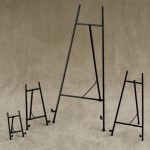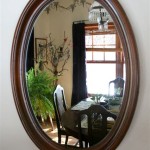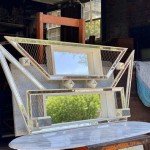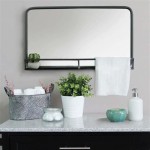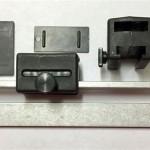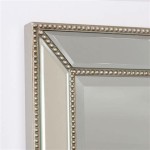Which Mirrors Are The Most Accurate?
Mirrors are ubiquitous objects, serving both functional and decorative purposes. However, not all mirrors are created equal. Subtle variations in manufacturing processes and materials can lead to distortions in the reflected image. Understanding these differences is crucial for applications where visual accuracy is paramount, such as in scientific instruments, telescopes, and even bathroom vanities where precise grooming is desired.
The accuracy of a mirror is determined by several factors, the most important being the flatness of the reflective surface. Ideally, a perfect mirror would possess a completely flat surface. However, achieving this ideal is practically impossible due to limitations in manufacturing techniques. Even the slightest imperfections, measured in nanometers, can introduce distortions.
The most accurate mirrors are typically made from high-quality glass, often referred to as "optical glass." This type of glass is formulated to minimize imperfections and inconsistencies in its structure. It undergoes a meticulous polishing process to achieve a surface as flat as possible. The flatness of a mirror is often specified using a measurement called "peak-to-valley," which represents the difference in height between the highest and lowest points on the surface.
Another crucial factor influencing mirror accuracy is the reflective coating. Traditional mirrors employ a silvering process where a thin layer of silver is deposited onto the back surface of the glass. While this method is cost-effective, it can lead to minor distortions due to the inherent properties of silver and the potential for uneven application. More advanced mirrors utilize dielectric coatings, which consist of multiple layers of thin films of precisely controlled thicknesses. These coatings offer superior reflectivity and durability, minimizing distortions and providing a more accurate reflection.
Dielectric mirrors are often preferred in scientific and optical applications due to their high reflectivity across a broader range of wavelengths. They can be designed to reflect specific wavelengths while transmitting others, making them essential components in lasers, optical filters, and scientific instruments.
Beyond the material and coating, the overall construction of the mirror also plays a role in its accuracy. The substrate, or the material supporting the reflective surface, must be rigid and stable to prevent warping or flexing that could distort the reflection. High-quality mirrors often utilize specialized substrates like Zerodur or low-expansion glass, which are engineered to maintain their shape even under varying temperatures and environmental conditions.
First-surface mirrors, where the reflective coating is applied to the front surface of the glass, offer higher accuracy compared to second-surface mirrors, where the coating is applied to the back. This eliminates the refraction and potential distortion caused by light passing through the glass twice in second-surface mirrors. However, first-surface mirrors are more susceptible to damage and require careful handling and cleaning.
Concave and convex mirrors, while useful for specific applications, introduce intentional curvature to the reflective surface, resulting in magnified or diminished images. These are not typically considered accurate in terms of replicating a true-to-size reflection. Their purpose is to manipulate light and create specific optical effects.
When selecting a mirror for applications requiring high accuracy, several specifications should be considered. The flatness, measured in peak-to-valley or wavelength fractions, provides a quantifiable measure of surface accuracy. Reflectivity, often expressed as a percentage, indicates the amount of light reflected by the mirror. The coating type, whether metallic or dielectric, influences both reflectivity and durability. Finally, the substrate material and construction are crucial for maintaining the mirror’s shape and stability over time.
The environment in which the mirror will be used also influences its performance. Temperature fluctuations, vibrations, and humidity can all impact the accuracy of a mirror. For extremely precise applications, specialized environmental controls may be necessary to maintain optimal conditions.
The cost of a mirror generally reflects its accuracy and quality. Mass-produced mirrors intended for everyday use are typically less expensive but may exhibit minor distortions. High-precision mirrors, manufactured with rigorous quality control and utilizing advanced materials and coatings, command a significantly higher price.
Understanding the factors that contribute to mirror accuracy allows for informed decisions when selecting a mirror for a specific purpose. Whether for scientific research, industrial applications, or personal grooming, choosing the right mirror ensures the most faithful and undistorted reflection possible.
Are Mirrors Accurate In Reflecting How You Re Really Supposed To Appear Do I Know What Look Like If Make Me Either Too Wide Or Thin

Why Do I Look Diffe In Mirrors 5 Common Reasons

Which One Is Accurate Why You Look Better In The Mirror
Is A Mirror Reflection Or Photograph More Accurate Interpretation Of The Way Person Looks Quora
What Is More Accurate A Mirror Or Photo When I Look In The Everything Symmetrical While It S Very Asymmetrical My Face Looks Lopsided That
Is The Mirror An Accurate Depiction Of What You Look Like Quora

Which Mirror Is The Most Accurate

Here S Why You Look Better In Mirrors Than Do Pictures Upworthy

Why Do I Look Diffe In Mirrors 5 Common Reasons

Why Do I Look Diffe In Mirrors 5 Common Reasons

